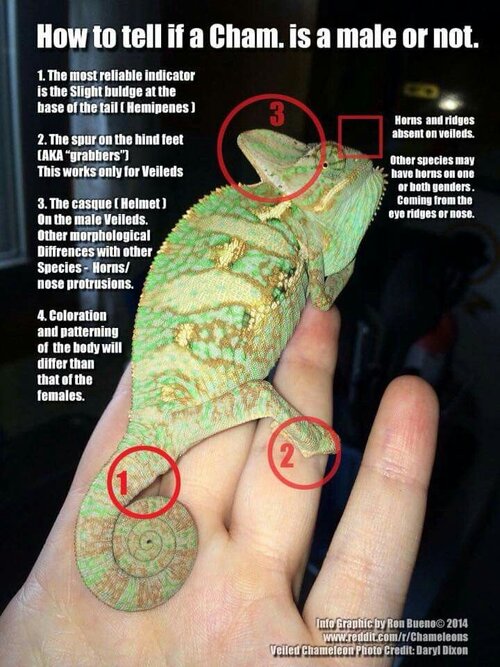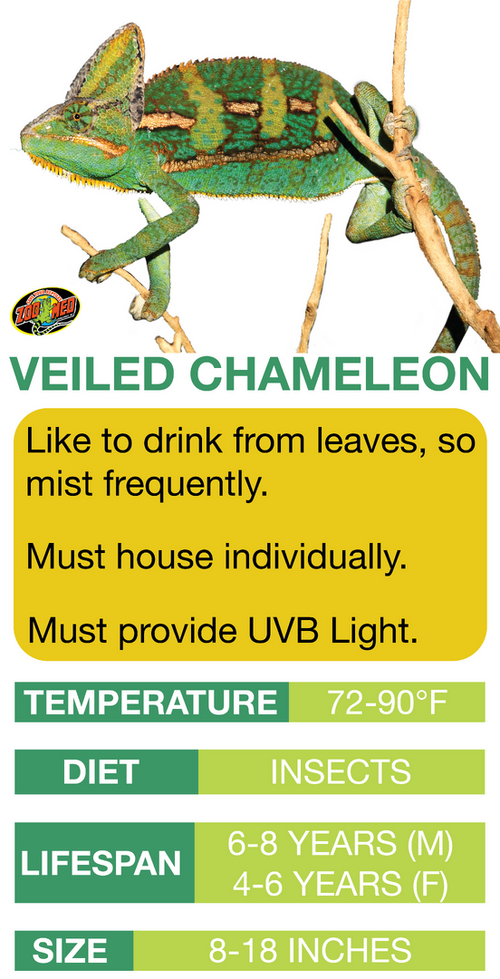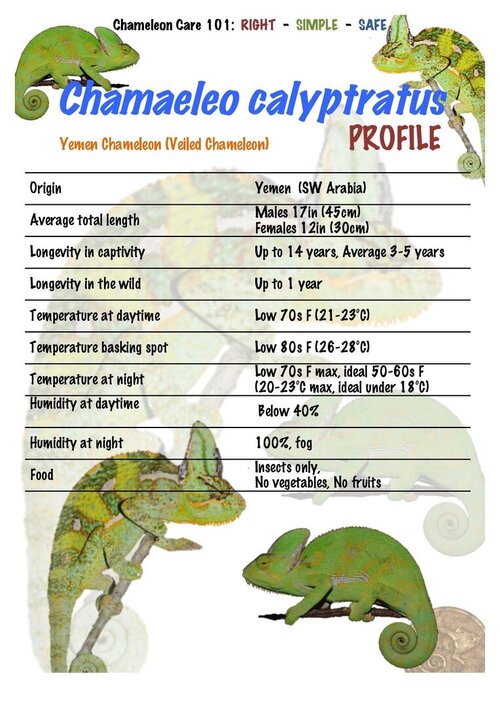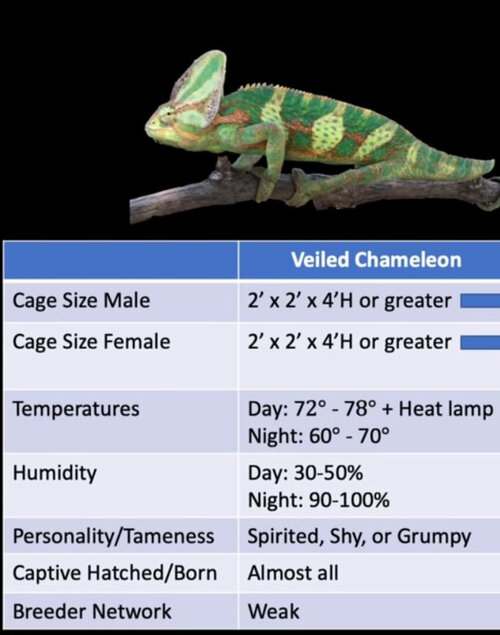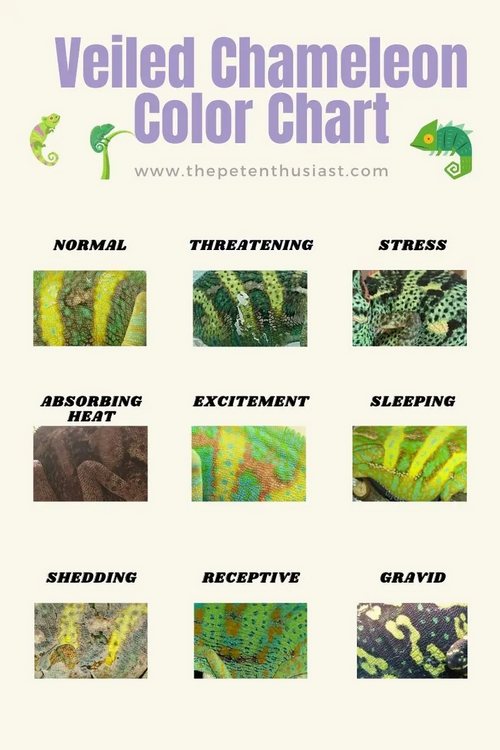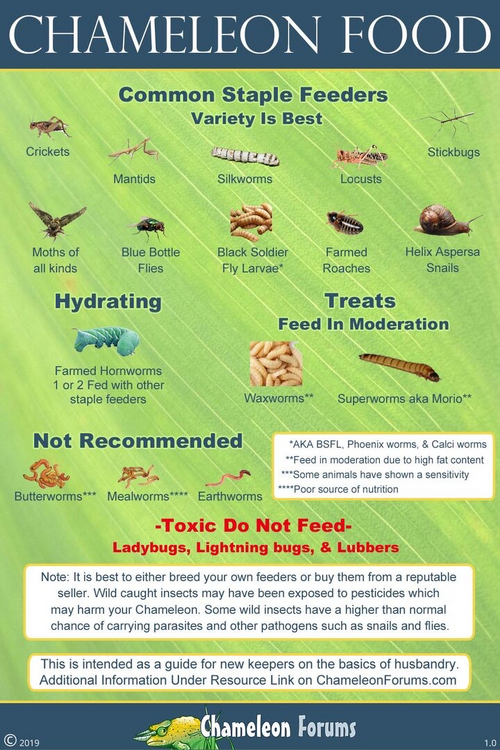Speechgirl2
Member
As a baptized by fire chameleon owner anxious to get through my learning curve and get my act together… I’ve found a lot of info that is convoluted or overwhelming… and a lot of info that seems more concise and easy to implement… so I thought I would share what I’ve learned so far with anyone interested. This is not scripture… just info I’ve gathered from various resources online
VEILED CHAMELEON BASICS:
EXCLOSURE love the Neptune site! Covers info in a very clear way.
-SIZE: Ideally 4 x 2 x 2 is a good basic size that will be ample for babies and juveniles, and the bare minimum for adults.
-LOCATION: It should be placed on a stable elevated surface for safety. It should be placed in an area with stable temps, away from vents, away from passerby traffic as they can become stressed with a lot of activity/movement in close proximity.
-AIRFLOW: a screened enclosure allows great airflow to help prevent mildew and mold given how much moisture they need daily.
-CLEANING THE ENCLOSURE https://chameleonschool.com/cleaning/
-ENCLOSURE FLOOR - I wipe mine down daily and keep a bare bottom floor for easy of cleaning.
-PLANTS live pothos throughout the terrarium is ideal. Any branches placed in the enclosure should meet specific requirements. Fake plants are not recommended. The chameleon should have access to SAFE PLANTS, SAFE BRANCHES, SAFE WATER, & SAFE FOOD TO EAT. That’s it!
NEPTUNE CHAMELEON VIDEO ON PLANTS
-MOISTURE (HUMIDITY & DROPLETS) They’re like to drink at the “bookends” of their day… shortly after their lights come on in the morning and shortly before their lights go off at night. They need to breathe in moist air at night when the temps drop… foggers, misters, & drip systems can cover these needs in a variety of ways.
I currently use a fogger on a timer from 7p to 7a to give my chameleon needed moisture while he sleeps to mimic a tropical jungle environment. I use a dripper filled with filtered water in the early morning and the early evening aimed to drip along leaves for easy drinking. I was recently given a mistking system and am seeing how that would do to replace the drip system… it’s more complicated expensive and there’s a learning curve to install it… but it is automated… so there’s that here are videos I found helpful with the mistking learning curve.
here are videos I found helpful with the mistking learning curve.
Mist king assembly
Mist king programming
HEAT… heating bulb specifically indicated for chameleons
UVB FIXTURE & BULB… there are lots of different bulb types and fixture types… most are too much or too little of what a chameleon needs. And only certain fixtures (must be high output) are compatible with the bulb so it can get really confusing. This combo is your best bet to avoid getting the wrong bulb or fixture:
FEEDING & SUPPLEMENTS:
I’ve attached some helpful pics covering this topic. I feed my baby chameleon dubias and crickets shortly after lights come on… and then again around 1pm. Once he’s 6 months old I’ll cut back to once per day. As an adult chameleon obesity is a common problem… so I’ll be diving more into that info as he gets closer to adulthood. live fender insects should not be wider or longer than the distance between the chameleons eyes as this corresponds to the width of their throat.
I dust all feeder insects with calcium Without D3 daily. Then every Sunday I alternate dusting them with calcium WITH D3 1st and 3rd Sundays and herptivite multivitamin every 2nd & 4th Sunday.
GROWTH& DEVELOPMENT https://dragonsdiet.com/blogs/chameleon-care/how-big-do-chameleons-get
SEE PICS FOR ADDITIONAL INFO!
That’s what I’ve learned so far in my baptized by fire first couple weeks of chameleon adoptive parenthood!! Feel free to chime in with any resources or tips you’ve found helpful!
VEILED CHAMELEON BASICS:
EXCLOSURE love the Neptune site! Covers info in a very clear way.
-SIZE: Ideally 4 x 2 x 2 is a good basic size that will be ample for babies and juveniles, and the bare minimum for adults.
-LOCATION: It should be placed on a stable elevated surface for safety. It should be placed in an area with stable temps, away from vents, away from passerby traffic as they can become stressed with a lot of activity/movement in close proximity.
-AIRFLOW: a screened enclosure allows great airflow to help prevent mildew and mold given how much moisture they need daily.
-CLEANING THE ENCLOSURE https://chameleonschool.com/cleaning/
-ENCLOSURE FLOOR - I wipe mine down daily and keep a bare bottom floor for easy of cleaning.
-PLANTS live pothos throughout the terrarium is ideal. Any branches placed in the enclosure should meet specific requirements. Fake plants are not recommended. The chameleon should have access to SAFE PLANTS, SAFE BRANCHES, SAFE WATER, & SAFE FOOD TO EAT. That’s it!
NEPTUNE CHAMELEON VIDEO ON PLANTS
-MOISTURE (HUMIDITY & DROPLETS) They’re like to drink at the “bookends” of their day… shortly after their lights come on in the morning and shortly before their lights go off at night. They need to breathe in moist air at night when the temps drop… foggers, misters, & drip systems can cover these needs in a variety of ways.
I currently use a fogger on a timer from 7p to 7a to give my chameleon needed moisture while he sleeps to mimic a tropical jungle environment. I use a dripper filled with filtered water in the early morning and the early evening aimed to drip along leaves for easy drinking. I was recently given a mistking system and am seeing how that would do to replace the drip system… it’s more complicated expensive and there’s a learning curve to install it… but it is automated… so there’s that
Mist king assembly
Mist king programming
HEAT… heating bulb specifically indicated for chameleons
UVB FIXTURE & BULB… there are lots of different bulb types and fixture types… most are too much or too little of what a chameleon needs. And only certain fixtures (must be high output) are compatible with the bulb so it can get really confusing. This combo is your best bet to avoid getting the wrong bulb or fixture:
Arcadia Reptile Pro T5 UVB D3+ Forest 6%UV-B 24 inch Single Lamp Kit
FEEDING & SUPPLEMENTS:
I’ve attached some helpful pics covering this topic. I feed my baby chameleon dubias and crickets shortly after lights come on… and then again around 1pm. Once he’s 6 months old I’ll cut back to once per day. As an adult chameleon obesity is a common problem… so I’ll be diving more into that info as he gets closer to adulthood. live fender insects should not be wider or longer than the distance between the chameleons eyes as this corresponds to the width of their throat.
I dust all feeder insects with calcium Without D3 daily. Then every Sunday I alternate dusting them with calcium WITH D3 1st and 3rd Sundays and herptivite multivitamin every 2nd & 4th Sunday.
GROWTH& DEVELOPMENT https://dragonsdiet.com/blogs/chameleon-care/how-big-do-chameleons-get
SEE PICS FOR ADDITIONAL INFO!
That’s what I’ve learned so far in my baptized by fire first couple weeks of chameleon adoptive parenthood!! Feel free to chime in with any resources or tips you’ve found helpful!
Attachments
Last edited:

